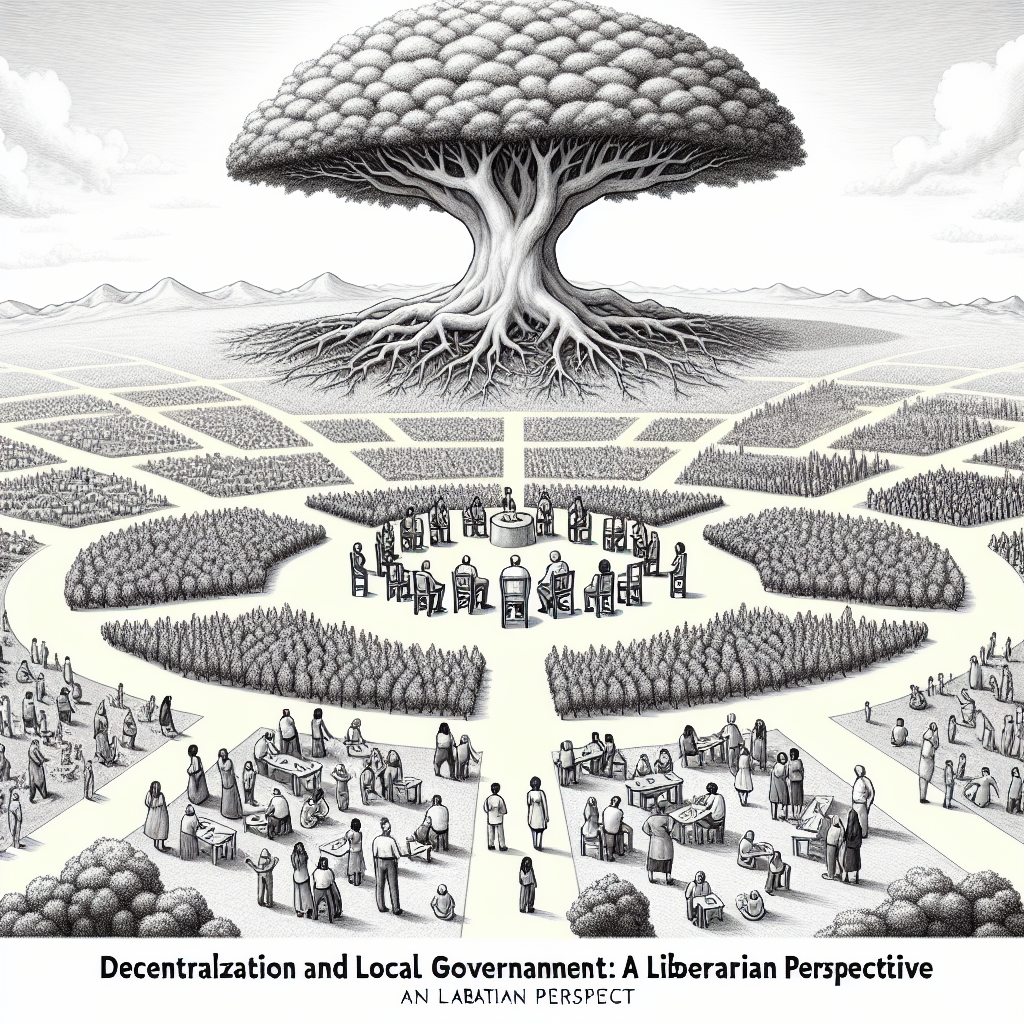Decentralization and Local Governance: A Libertarian Perspective
In recent years, the concepts of decentralization and local governance have gained traction as effective means to empower communities and promote individual liberties. From a libertarian perspective, this movement is not just a political choice; it reflects an essential philosophy advocating for minimal state intervention, personal freedom, and local autonomy. This article will explore the principles of decentralization and local governance through a libertarian lens, illustrating the benefits and challenges of these systems in contemporary society.
What is Decentralization?
Decentralization refers to the distribution of authority, responsibility, and resources across various levels of government and governance structures. Instead of a centralized national authority making decisions for all citizens, decentralization empowers local governments, communities, and individuals to make choices that affect their lives directly. This structure promotes efficiency, accountability, and responsiveness to the unique needs of local populations.
Key Principles of Decentralization
-
Autonomy: Local governments have the authority to govern themselves without excessive oversight from higher governmental bodies.
-
Accountability: Local leaders are closer to the citizens they serve, making them more accountable and thus aligning their interests with those of their constituents.
- Efficiency: Local governance often operates more efficiently by tailoring services and policies to the specific desires and needs of local populations.
The Libertarian Perspective on Local Governance
Libertarians advocate for a smaller role of the state in the lives of individuals. They believe that when local governance is emphasized, communities and individuals experience greater freedom. This viewpoint aligns naturally with the ideals of decentralization.
Individual Liberty and Empowerment
Local governance allows individuals more say in the decisions that affect their everyday lives. Libertarians argue that decentralizing power not only enhances personal liberties but also fosters a sense of community empowerment. By allowing local communities to develop their policies and systems, citizens can engage more actively in the democratic process.
The Role of Free Markets
From a libertarian standpoint, free markets thrive under decentralization. Local businesses can compete more effectively when local governments support economic freedom and remove unnecessary regulations. This not only leads to economic growth but also allows communities to innovate and adapt to changing circumstances in ways that a central authority often fails to achieve.
Benefits of Decentralization and Local Governance
-
Enhanced Responsiveness: Local governments can react more swiftly to changing circumstances and address community-specific needs more effectively than a centralized system.
-
Reduced Bureaucracy: Decentralization can substantially reduce bureaucratic red tape, allowing for quicker implementation of policies and programs.
-
Increased Public Participation: When citizens feel that they have a direct influence on decisions affecting their lives, they are more likely to engage in governance processes. This bolsters democracy at the grassroots level.
- Tailored Solutions: Local governments are better positioned to understand the unique challenges of their communities, allowing them to devise more effective solutions.
Challenges to Decentralization
While there are several potential benefits, decentralization is not without its challenges.
Inequality Across Regions
One of the main critiques of decentralization is the potential for disparities between different local governments. Wealthier areas may benefit from better governance and resources, exacerbating inequalities among regions.
Coordination Problems
Decentralization can lead to fragmentation of services, posing challenges in areas that require coordinated efforts, such as environmental policies, public health, and infrastructure.
Risk of Local Tyranny
Just as power at the national level can lead to tyranny, local governance can also become oppressive. Libertarians argue for safeguards to ensure that local authorities respect individual rights, while still emphasizing the importance of localized decision-making.
How Libertarians Advocate for Effective Decentralization
To promote effective decentralization and local governance, libertarians suggest various strategies:
Education and Advocacy
Libertarians must prioritize educating communities about their rights and the benefits of decentralization. Awareness campaigns can empower citizens to demand greater local control.
Supporting Local Initiatives
Advocating for local cooperatives, community organizations, and initiatives can promote decentralized governance structures that align with libertarian values.
Building Stronger Local Economies
Encouraging local business development and entrepreneurship can bolster community economies, allowing local governments to thrive autonomously.
Conclusion
Decentralization and local governance resonate with core libertarian principles of individual liberty, minimal state intervention, and community empowerment. While challenges exist, the potential for enhanced responsiveness, accountability, and tailored solutions makes a compelling case for this approach. By promoting decentralization, libertarians envision a society where individuals can exercise their freedoms fully, and local governments operate as dynamic, responsive entities tailored to the needs of the communities they serve. Embracing decentralization could herald a new era of governance that prioritizes the values of liberty, justice, and opportunity for all.
Share this content:








Post Comment